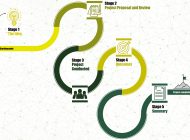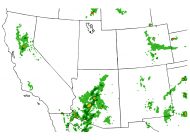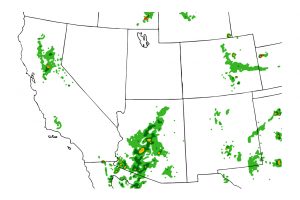Talk to anyone affiliated with Plymouth State University and you’re likely to hear a common refrain: “At Plymouth, you’re a face, not a number.” Nowhere is this truer than in the University’s undergraduate and graduate degree programs in education. “If you want to be anonymous, you can be for about two weeks and then you are part of the family,” says Cheryl Baker ‘97MEd, ‘05CAGS, ‘11EdD, a graduate teaching lecturer and interim director for the Holmes Center for School Partnerships and Educator Preparation at the University.
Plymouth State is justly proud of the strong sense of community shared by its education alumni, an attitude that springs in part from the University’s rich heritage in the field. The institution’s commitment to the teaching of teachers dates back to its founding in 1808 as Holmes Plymouth Academy, a pioneer institution for teacher training. In 1927, the American Council of Teacher Colleges evaluated Plymouth Normal School and granted it a Grade A rating as a teachers college. Nearly a century later, that rating still stands.
“You can’t ignore our history,” says Gail Mears, Dean of the College of Education, Health and Human Services. “We began as a laboratory school for teaching—the town’s school was on our campus. From the outset, we embraced a hands-on approach to educating our educators, with great attention to pedagogy, and that attitude has been a hallmark of Plymouth State ever since.” This student-centered approach is what makes Plymouth such a remarkable institution for educating educators, Mears notes, and in many respects, the introduction of Integrated Clusters is more aptly described as a natural progression in the University’s proud legacy than a new way of teaching.
Because of its strong commitment to teaching, Plymouth State has made, and continues to make, an indelible mark on the state’s educational landscape. The numbers say it all; in any given year, over 40 percent of all school administrators in New Hampshire are Plymouth State graduates. And for those currently enrolled in the College of Education, 36 percent of the graduate students and 12 percent of the undergraduates are in a program that leads to certification.
These students enjoy access to a diverse education preparatory unit that encompasses bachelor’s, master’s and doctoral degrees as well as a certificate of advanced graduate study (CAGS); a multiplicity of programs from early childhood to higher education; and numerous multi-disciplinary contacts with community partners around the state. With the introduction of Integrated Clusters, asserts Mears, these relationships will only become more robust. “Integrated clusters will put us in version 2.0,” she observes.
Through Integrated Clusters, continues Mears, faculty will not only be able to explore education issues across the region in greater depth, but also consider ways that the University can partner with schools around the state to meet the demands placed on educational institutions. “New Hampshire’s education system is facing challenges —particularly in economically strapped areas—so it’s exciting to explore ways in which Plymouth State can assist these communities. It’s incumbent on us to think about how we prepare our students, and by extension K-12 students, to look beyond the four walls of the classroom when addressing the real-world issues they’re likely to confront.” Faculty are constantly seeking ways to link concepts and practical applications, Mears notes, and the Integrated Clusters model will only make this process stronger. “The forthcoming opportunities for enhanced bi-directional relationships between the University, surrounding communities, and our school partners are incredibly exciting.”
A Marriage of Theory and Application
Such collaborative relationships are a powerful tool for experiential learning, and a benefit that is amplified by Plymouth State’s size. With a combined undergraduate and graduate student body of just 927, education faculty and students get to know one another well, thereby ensuring that students are able to obtain an education that speaks to their needs and interests. “Our programs are distinguished in no small measure by the caring and thoughtfulness demonstrated by everyone involved,” says Baker. One example of the college’s commitment to students, she adds was the creation of a student chapter of the Association for Supervision and Curriculum Development (ASCD). “Plymouth’s ASCD student chapter was the first in the state, and it’s incredibly important because it allows students to start networking with people who are doing what they aspire to do.”
Mike Whaland ’06, ‘08G, ‘13CAGS is one of many alumni who feels strongly that he has benefited from the education and networking opportunities afforded him at the University. “Plymouth State does a great job of fostering connections while also offering students a valuable sense of autonomy,” notes Whaland. “During my time as a student, I built close bonds with the faculty and with other students, which enhanced my knowledge of the educational environment here in New Hampshire and made me more effective as an administrator. The University offers students a nice marriage of best practices and educational philosophy coupled with practical experience.”
Currently the Assistant Principal at Lancaster Elementary School in Lancaster, NH, Whaland is the perfect example of the engaged, life-long
learner commonly found within the education department’s alumni body. He is presently pursuing his doctorate in education at Plymouth; is a teaching lecturer at the University; and, together with Lancaster Principal Todd Lamarque, was recently awarded a grant by the New Hampshire Charitable Foundation’s Neil and Louise Tillotson Fund to design and build a living laboratory on Lancaster’s school grounds to “increase science content knowledge to existing educators through collaboration with Plymouth State University.”
Whaland and Lamarque’s project offers a prime example of Integrated Clusters at work, uniting Lancaster K-8 educators with faculty from Plymouth State and personnel from Squam Lakes Natural Science Center to develop innovative methods for teaching the more abstract principles of Science, Technology, Engineering, and Mathematics (STEM). Lancaster teachers will be trained to teach STEM topics with the principles of permaculture—agricultural ecosystems designed to be sustainable and self-sufficient. Their efforts will culminate in the design of a bio shelter greenhouse at the Lancaster School that will serve as open laboratory for teaching STEM topics.
Another example of Integrated Clusters in action is Plymouth State’s nascent Lancaster Initiative, a project that brings together faculty and more than 60 PSU students from 10 different disciplines—adventure education, art, business, communications, graphic design, health promotion, languages, marketing, travel, and tourism—with Lancaster, NH business leaders and community groups to address community sustainability. Working in a series of seven client-based teams, students are exploring ways to stimulate entrepreneurial ventures and attract young professionals to this small North Country community, with a specific focus on multi-use planning for the historical Lancaster National Bank Building. Simply put, the initiative offers students a valuable opportunity to apply knowledge gained in the classroom to real-world problems.
The University focuses on teaching students to network and integrate into different domains, says Whaland, something he believes is very wise. “Learning isn’t done in isolation—as an educator, you always need to be thinking about how learning relates to the wider world and how to translate your skills outside the classroom. Plymouth State does a great job of fostering connections and giving students the autonomy they need to grow. I got a job right out of my master’s program and I felt very prepared to walk into my role in a public school.”
Now on the other side of the table, Whaland says he continues to be impressed with the level of preparation he sees in new Plymouth State education graduates. “When I encounter teachers who have trained at PSU, I know before we even begin talking that they will possess a strong foundation in the fundamentals and be on top of best practices in areas such as common core and assessment. I’m also confident that they will walk into their classrooms with practical experience under their belts. PSU grads are very good at hitting the ground running.” Based on information received from school administrators working with Plymouth State College of Education graduates, says Cheryl Baker, the University’s graduates are very knowledgeable. “They’re content driven, they’re well versed in the standards, they know how to develop curriculum, and they know how to take direction.”
A Seamless Continuum of Learning
“Plymouth State is a wonderful place to learn,” observes Whaland. “The professors are very close to their students. They get to know them as individuals, so they know how to support them, as well as how far and how hard to push them, and when to apply that pressure. You don’t get lost in the weeds. You have so many people looking out for you—your professors, your advisors—that you can’t hide, and that’s a good thing!”
“In the graduate school, coordinators go out of their way to make sure that students get what they need,” agrees Baker. “We create programs that meet the rigorous standards that education follows while also honoring the needs of the individual.” The University’s CAGS program is a perfect example. Some students complete the certificate in a couple of years, while others take four to five years to work through the program.
And to ensure that education graduates stay up-to-date with ongoing opportunities after leaving Plymouth, faculty make it a point to stay in touch, offering support and advice as needed. “Even though I graduated in 2013, I’m still in touch with a number of my professors and know that I can reach out to them any time I’m in need of guidance,” says Whaland. “As educators, we use the term ‘educational community’ quite a bit, but Plymouth State really has created a network of peers and mentors in which everyone strives to be the best. The University fosters an ongoing sense of community among its graduates that is second to none.”
In the end, it is that sense of community that has brought Plymouth State full circle, from its earliest days as a laboratory school—one in which students carried classroom knowledge into real-world situations —to its current iteration as an institution comprised of Integrated Clusters and open laboratories. Students continue to join theory with application, building on individual strengths to create unique paths to learning and perpetuate the school’s founding motto, Ut prosim “That I may serve.”
■ Lori Ferguson
Tags: alumni early childhood education education educators Gail Mears Holmes Center for School Partnerships and Educator Preparation integrated clusters Lancaster Lancaster Initiative Leadership Plymouth Normal School ut prosim



















